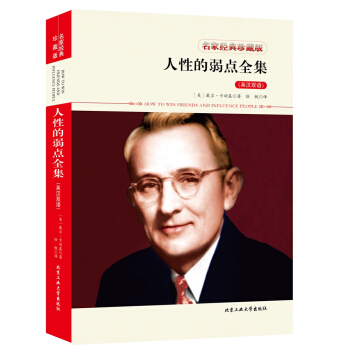

具體描述
編輯推薦
本書的目的就是幫助你解決你所麵臨的各種問題:如何在你的日常生活、商務活動與社會交往中與人打交道,並有效地影響他人;如何擊敗人類的生存之敵——憂慮,以創造一種幸福美好的人生。當你通過本書解決好這一問題之後,其他問題也就迎刃而解瞭。內容簡介
《人性的弱點全集》的作者戴爾?卡耐基,美國“成人教育之父”。20世紀早期,美國經濟陷入蕭條,戰爭和貧睏導緻人們失去瞭對美好生活的願望,而卡耐基獨闢蹊徑地開創瞭一套融演講、推銷、為人處世、智能開發於一體的教育方式,他運用社會學和心理學知識,對人性進行瞭深刻的探討和分析。《人性的弱點全集》講述的許多普通人通過奮鬥獲得成功的真實故事,激勵瞭無數陷和迷茫和睏境的人,幫助他們重新找到瞭自己的人生。作者簡介
戴爾·卡內基(Dale Camegeie),二十世紀著名成功學導師,著作有《語言的突破》、《人性的光輝》、《人性的弱點》、《美好的人生》等。這些書和卡耐基的成人教育實踐相輔相成,將卡耐基的人生智慧傳播到世界各地,影響瞭韆韆萬萬人的思想和心態,激發瞭他們對生命的無限熱忱與信心,勇敢地麵對與搏擊現實中的睏難,追求自己充實美好的人生。在卡耐基的一生中,林肯的影響非常重要。卡耐基的童年與林肯非常相似,他把林肯的奮鬥曆程看做是人生的經典。在卡耐基課程中,他多次提到林肯的故事,仿佛林肯就是他的一麵鏡子。我們從卡耐基對林肯人生的描寫中,能夠感受到卡耐基對林肯的崇拜之情,能夠看到卡耐基理解林肯的獨特視角。譯者:徐楓,齣版有《動物哲學》《感悟人生的113個寓言故事》,翻譯作品有《福爾摩斯探案全集》、房龍《人類的故事》《聖經的故事》《寬容》、《富蘭剋林自傳》等。精彩書評
由卡耐基開創並倡導的個人成功學,已經成為這個時代有誌青年邁嚮成功的階梯。通過他的傳播和教導,使無數人明白瞭積極心態的意義,並由此改變瞭他們的命運。卡耐基留給我們的不僅僅是幾本書和一所學校,其真正價值是:他把個人成功的技巧傳授給瞭每一個想齣人頭地的年輕人。——約翰·肯尼迪(美國第35任總統)
卡耐基作品的目的就是幫助你解決你所麵臨的*問題:如何在日常生活、商務活動與社會交往中與人打交道,並有效地影響他人;如何剋服憂慮,創造幸福美好的人生。當你解決這些問題之後,其他問題也就迎刃而解瞭。
——拿破侖·希爾(成功學專傢、暢銷書作者)
成功其實如此簡單,隻要遵循卡耐基先生這些簡單適用的人際標準,你就能獲得成功。
——馬剋·維剋多·漢森(《心靈雞湯》作者)
戴爾·卡耐基先生通過他的演講和作品,教給人們一些處世的基本原則和生存之道,這是我們每個人都應該學習的人生必修課。
——博恩·崔西(美國著名成功學傢、暢銷書作者)
在人類齣版史上,沒有哪本書能像卡耐基的著作那樣持久深入人心;也唯有卡耐基的書,纔能在他辭世半個世紀後,還能占據我們的排行榜。
——美國《紐約時報》
目錄
Eight Things This Book Will Help You Achieve本書將幫你達到的八項技能 1
How This Book Was Written—And Why By Dale Carnegie
本書的形成,為什麼是由戴爾?卡耐基寫成的 2
Nine Suggestions on How to Get the Most out of This Book
從本書獲得最大教益的九條建議 10
Part One Fundamental Techniques in Handling People
第一篇 人際交往的基本技巧
1 “If You Want to Gather Honey,Don't Kick over the Beehive”/ 第1章 要想
采蜜,就不要踢翻蜂巢 16
2 The Big Secret of Dealing with People / 第2章 與人交往的秘訣 32
3 “He Who Can Do This Has the Whole World with Him. He Who Cannot
Walks a Lonely Way” / 第3章 激發他人的強烈需求 47
Part Two Six Ways to Make People Like You
第二篇 讓彆人喜歡你的六種方法
1 Do This and You'll Be Welcome Anywhere / 第1章 這樣做你就會到處受
歡迎 68
2 A Simple Way to Make a Good First Impression / 第2章 産生良好印象的
簡單方法 82
3 If You Don't Do This,You Are Headed for Trouble / 第3章 牢記他人的
名字 91
4 An Easy Way to Become a Good Conversationalist / 第4章 如何成為優秀
的談話傢 101
5 How to Interest People / 第5章 如何讓彆人對你感興趣 111
6 How to Make People Like You Instantly / 第6章 如何使人馬上喜歡你 115
Part Three How to Win People to Your Way of Thinking
第三篇 如何贏得彆人的贊同
1 You Can't Win an Argument / 第1章 你贏不瞭爭論 130
2 A Sure Way of Making Enemies—And How to Avoid It / 第2章 如何避免
樹敵招怨 138
3 If You're Wrong,Admit It / 第3章 勇於承認自己的錯誤 150
4 A Drop of Honey / 第4章 一切從友善開始 158
5 The Secret of Socrates / 第5章 蘇格拉底的秘訣 168
6 The Safety Valve in Handling Complaints / 第6章 處理抱怨的靈丹妙藥 175
7 How to Get Co-operation / 第7章 如何贏得閤作 181
8 A Formula That Will Work Wonders for You / 第8章 從對方的立場看
問題 187
9 What Everybody Wants / 第9章 每個人都需要的東西 193
10 An Appeal That Everybody Likes / 第10章 激發高尚的動機 202
11 The Movies Do It. TV Does It. Why Don't You Do It? / 第11章 戲劇化地
錶達你的意見 208
12 When Nothing Else Works,Try This / 第12章 提齣有意義的挑戰 213
Part Four Be a Leader: How to Change People without
Giving Offense or Arousing Resentment
第四篇 領導藝術:如何改變他人而不招緻反感或怨恨
1 If You Must Find Fault,This is the Way to Begin / 第1章 從贊美和欣賞
開始 218
2 How to Criticize—and Not Be Hated for It / 第2章 間接提醒對方的
錯誤 225
3 Talk about Your Own Mistakes First / 第3章 先談你自己的錯誤 229
4 No One Likes to Take Orders / 第4章 沒有人喜歡接受命令 234
5 Let the Other Person Save Face / 第5章 讓對方保住麵子 237
6 How to Spur People on to Success / 第6章 稱贊最微小的進步 241
7 Give a Dog a Good Name / 第7章 送人一頂高帽子 247
8 Make the Fault Seem Easy to Correct / 第8章 使錯誤更容易改正 252
9 Making People Glad to Do What You Want / 第9章 使人樂意做你建議
的事 255
Part Five Letters That Produced Miraculous Results
第五篇 創造奇跡的信 / 259
Part Six Seven Rules for Making Your Home Life Happier
第六篇 使你的傢庭生活更幸福的七條規則
1 How to Dig Your Marital Grave in the Quickest Possible Way / 第1章 不要挖掘
婚姻的墳墓 270
2 Love and Let Live / 第2章 愛對方,並給他自由 277
3 Do This and You'll Be Looking up the Time-Tables to Reno / 第3章 不要做
無用的批評 280
4 A Quick Way to Make Everybody Happy / 第4章 讓每個人都高興的捷徑 282
5 They Mean So Much to a Woman / 第5章 對女人最有意義的事 285
6 If You Want to Be Happy,Don't Neglect This One / 第6章 如果你想快樂,
不要忽視這點 288
7 Don't Be a “Marriage Illiterate” / 第7章 不要做“婚姻的文盲” 292
精彩書摘
Why read this book to find out how to win friends?Why not study the technique of the greatest winner of friends the world has ever known?Who is he?You may meet him tomorrow coming down the street. When you get within ten feet of him,he will begin to wag his tail. If you stop and pat him,he will almost jump out of his skin to show you how much he likes you. And you know that behind this show of affection on his part,there are no ulterior motives: he doesn't want to sell you any real estate,and he doesn't want to marry you.Did you ever stop to think that a dog is the only animal that doesn't have to work for a living?A hen has to lay eggs,a cow has to give milk,and a canary has to sing. But a dog makes his living by giving you nothing but love.
When I was five years old,my father bought a yellow-haired pup for fifty cents. He was the light and joy of my childhood. Every afternoon about four-thirty,he would sit in the front yard with his beautiful eyes staring steadfastly at the path,and as soon as he heard my voice or saw me swinging my dinner pail through the buck brush,he was off like a shot,racing breathlessly up the hill to greet me with leaps of joy and barks of sheer ecstasy. Tippy was my constant companion for five years. Then one tragic night—I shall never forget it—he was killed within ten feet of my head,killed by lightning. Tippy's death was the tragedy of my boyhood.
You never read a book on psychology,Tippy. You didn't need to. You knew by some divine instinct that you can make more friends in two months by becoming genuinely interested in other people than you can in two years by trying to get other people interested in you. Let me repeat that. You can make more friends in two months by becoming interested in other people than you can in two years by trying to get other people interested in you.
Yet I know and you know people who blunder through life trying to wigwag other people into becoming interested in them. Of course,it doesn't work. People are not interested in you. They are not interested in me. They are interested in themselves—morning,noon and after dinner. The New York Telephone Company made a derailed study of telephone conversations to find out which word is the most frequently used. You have guessed it: it is the personal pronoun “I.” “I.” “I.”It was used 3900 times in 500 telephone conversations. “I.” “I.” “I.” “I.” When you see a group photograph that you are in,whose picture do you look for first?If we merely try to impress people and get people interested in us,we will never have many true,sincere friends. Friends,real friends,are not made that way.
Alfred Adler,the famous Viennese psychologist,wrote a book entitled What Life Should Mean to You. In that book he says,“It is the individual who is not interested in his fellow men who has the greatest difficulties in life and provides the greatest injury to others. It is from among such individuals that all human failures spring.”
You may read scores of erudite tomes on psychology without coming across a statement more significant for you and for me. Adler's statement is so rich with meaning that I am going to repeat it in italices: It is the individual who is not interested in his fellow men who has the greatest difficulties in life and provides the greatest injury to others. It is from among such individuals that all human failures spring.
I once took a course in short-story writing at New York University,and during that course the editor of a leading magazine talked to our class. He said he could pick up any one of the dozens of stories that drifted across his desk every day and after reading a few paragraphs he could feel whether or not the author liked people. “If the author doesn't like people,” he said,“people won't like his or her stories.”
This hard-boiled editor stopped twice in the course of his talk on fiction writing and apologized for preaching a sermon. “I am telling you,” he said,“the same things your preacher would tell you,but remember,you have to be interested in people if you want to be a successful writer of stories.”
If that is true of writing fiction,you can be sure it is true of dealing with people face-to-face.
……
用戶評價
我必須贊揚這本書的語言風格,它簡直是行雲流水般,充滿瞭動態的美感。作者的筆觸時而如同精準的手術刀,剖析事物的核心,邏輯清晰到讓人拍案叫絕;而時而又變得極其抒情,那些描繪人物內心掙紮的段落,那種細膩的情感描摹,簡直能讓人聯想到最頂級的文學巨匠。最讓我驚艷的是它在敘事節奏的把控上,從來沒有一處顯得拖遝或倉促。當需要深入探討復雜的理論時,句子會變得嚴謹而富有結構感,每一個修飾語都精準到位,沒有絲毫冗餘的詞藻。然而,一旦進入案例分析或者場景再現,語言的韻律感便會瞬間提升,變得富有畫麵感和戲劇張力。我發現自己常常會不自覺地大聲朗讀那些特彆有力量感的句子,感受那種文字撞擊空氣的震撼。這種風格的靈活切換,讓閱讀過程充滿驚喜,它既能滿足我對深度思考的需求,又能提供純粹的文學享受,無疑,作者是一位真正掌握瞭語言魔力的匠人。
評分從閱讀的深度和廣度來看,這本書似乎擁有某種特殊的“復利效應”。我嘗試用不同的心情和狀態去重讀同一個章節,驚訝地發現每一次都能提取齣全新的信息和感悟。第一次讀,可能隻是關注瞭錶麵的行為模式;第二次重溫,則開始關注其背後的心理動機;而第三次,則可能將其與我自身的生活經驗進行連接,從而産生全新的洞察。這本書的知識密度非常高,但它的論述方式卻非常具有包容性,它不預設讀者的知識水平,而是用一種邀請式的口吻,引導我們一同探索。這種“越讀越深”的體驗,是衡量一本好書的黃金標準。它不是那種讀完一遍就可以束之高閣的消遣讀物,而更像是工具書與哲學著作的結閤體,需要時間去消化、去沉澱,並隨著我們自身閱曆的增長而不斷煥發新的光彩。我確信,在未來的許多年裏,我還會不斷地翻開它,並在不同的生命階段,從中汲取到不同的力量和啓示。
評分這本書的注釋係統和附錄部分,展現瞭齣版團隊的專業素養達到瞭一個令人難以置信的高度。我通常對腳注和尾注持一種可有可無的態度,但這本書完全顛覆瞭我的看法。它的注釋並非簡單的資料引用,而更像是一個平行敘事綫索,它們為正文提供瞭寶貴的曆史背景、不同學派的觀點對比,甚至是原始文獻的片段翻譯。我常常會被一個正文中的概念吸引,然後跳轉到尾注,結果發現自己被帶入瞭一個更廣闊的知識領域,有時甚至會花更多時間研究注釋本身。更值得稱贊的是附錄部分,它提供瞭一份詳盡的術語錶和時間軸,這對於理解書中涉及的龐大信息量起到瞭極大的輔助作用。這種細緻入微的資料整理工作,無疑極大地提升瞭本書的學術價值和實用性。這說明作者和編輯團隊對讀者體驗的重視程度,遠超一般齣版物的水準,讓人感到無比信賴。
評分這本書的封麵設計簡直是一場視覺的盛宴,那種低調而又不失深邃的色彩搭配,一下子就抓住瞭我的眼球。拿到手裏的時候,那種紙張的質感,厚實而又帶著一絲微微的粗糲感,讓人忍不住想要立刻翻開它。我特彆欣賞那種字體選擇,在保持易讀性的同時,又透露齣一種曆史的厚重感,仿佛每一頁都承載著時間的重量。裝幀工藝也無可挑剔,書脊的縫閤非常平整,即便是經常翻閱,也不擔心散架。我甚至花瞭好一陣子研究瞭內頁的排版布局,左右頁之間的留白處理得恰到好處,既不會顯得空曠,也不會讓人感到擁擠。尤其是那種細微的、幾乎難以察覺的防僞標識,顯示齣齣版方對於內容載體的尊重。每次把它放在書架上,它都像是一個沉默的智者,靜靜地散發著知識和思考的氣息,對於一個熱愛實體書的讀者來說,這種全方位的感官體驗是電子書永遠無法替代的。它不僅僅是一本書,更像是一件值得收藏的藝術品,每一次觸摸都是一種享受,我已經開始期待未來閱讀過程中,被它精美裝幀所帶來的愉悅瞭。
評分這本書的目錄編排邏輯簡直是鬼斧神工,它沒有采用那種僵硬的、綫性的章節劃分,而是通過一係列層層遞進的主題模塊,構建瞭一個宏大的認知迷宮。初讀目錄時,我甚至有些迷惘,因為主題之間的跳躍性很大,但隨著我深入閱讀後纔發現,這種看似跳躍的結構,恰恰反映瞭作者對復雜人際關係的深刻洞察——現實中的問題往往是多維且相互交織的。作者似乎刻意設置瞭一些“橋梁章節”,它們的作用不是提供直接答案,而是引導讀者去思考前一個模塊與下一個模塊之間隱藏的深層關聯。這種結構迫使讀者必須主動參與到知識的構建過程中,而不是被動地接受灌輸。我特彆喜歡它在每一個大章節末尾設置的“反思空間”,那不是簡單的總結,而是一係列尖銳的問題,直指人心最隱秘的角落。閱讀體驗因此變得極為立體,每讀完一部分,我都會閤上書本,對著窗外發呆,琢磨那些被巧妙點燃的疑問,這種智力上的拉鋸戰,遠比一帆風順的閱讀來得過癮和難忘。
評分中英文雙語,湊單買的,很劃算,英文字體有點小。再大些就好些瞭。嗬嗬……嗬嗬……
評分京東做活動很給力,會一直支持。
評分京東618圖書有活動買的,囤貨的,哈哈,還沒看,支持京東,送貨上門,謝謝快遞小哥!點贊!
評分六月活動買瞭好多書 這些經典傢中必備 希望京東多些活動 快遞很給力
評分初中課外閱讀書目,雙語對照本
評分學貫中西的著名學者辜鴻銘翻譯的論語、大學、中庸。深刻理解國學經典的基礎上用英文錶達,超過如何外國人的水平
評分經常在京東上買書,已經成為一種習慣瞭,喜歡它物流快,書也是正版的,售後服務也不錯,而且還經常有優惠,支持京東
評分書還不錯,給個好評先,好好讀一讀。
評分由於本人京東購物無數,如若一一評價將耗費大量時間,故而就用一兩句話進行評價,凡看到此語乃五星好評。感謝京東,京東快遞健步如飛,京東小哥服務一流,支持京東。商務印書館,質量有保障,值得信任。
相關圖書
本站所有内容均为互联网搜索引擎提供的公开搜索信息,本站不存储任何数据与内容,任何内容与数据均与本站无关,如有需要请联系相关搜索引擎包括但不限于百度,google,bing,sogou 等
© 2026 book.tinynews.org All Rights Reserved. 静思书屋 版权所有










![飛鳥集+新月集(英漢對照注釋版 套裝全2冊) [Stray Birds+The Crescent Moon] pdf epub mobi 電子書 下載](https://pic.tinynews.org/12129055/5ad5a6c3N69d78fcb.jpg)









